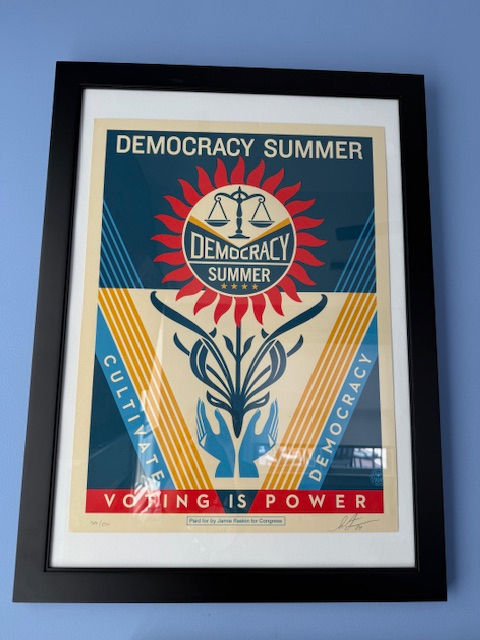Beholder (Or, Creating Art)
- erikaraskin

- Jun 30, 2022
- 4 min read

I went on a museum field trip not too long ago and had a revelation.
I'm sure I'm not the first person to have pondered the following -- but isn't it wild to think that all sorts of currently priceless artifacts may well have started off as gee gaws shoved in the junk drawers of days of yore? I mean the pottery fragment on display could have come from a set of unregistered-for-salad plates some caveman's new bride couldn't put in the give-away bag fast enough.
Or you know, accidentally dropped.
In other words, it's entirely possible that the items guarded by roving security officers were actually once considered heinous, the prehistoric equivalent of dinnerware stamped with terrifying clown faces.
And yet because it found itself in a random archaeologist's sieve, the remnant is now considered an invaluable treasure.
My point, (if I must have one) is that the older I get the more I realize that everything is subjective, affected by the times, tastes and often, the size of marketing campaigns behind it.
Popularity-slash-value is ephemeral, subject to individual fancy. And current zeitgeist. Which by its nature is constantly shifting.
This is true for pretty much anything. Think: all-the-rage gingham window treatments moldering in landfills atop Beanie Babies and expired boxes of home perm treatments. Or the fact that Knock Three Times by Tony Orlando and Dawn was on in the car every time I went anywhere as a kid.
It's also true in terms of literature.
Bestsellers don't generally just happen. There are merchandising strategies and advertisements and speaking engagements of varying importance. (At my first book signing I competed with a middle school band holding a musical fundraiser in the back of a bookstore. That worked out well.)
But the fact is, sooner or later autographed copies of even List-topping titles (I'm not talking about reaching number 1 in a weird category on Amazon like Domestic Goddess Fan Fiction but the New York Times Bestseller List) --even those tomes can end up on the remaindered table at Barnes and Noble. (I know because I've gotten a couple.)
But just like the fragments of early dinnerware, there is no objective quality to fiction. One person's Great American Novel is another's snore. For instance, I have friends and family who can quote Shakespeare chapter and verse and as soon as they do my teeth start to hurt and I have to leave the room.
And for all we know, that could have been true back in the day, too. Old Will might have been that cocktail party guest who could have consistently started a rush to the bar whenever he opened his mouth to perform a line or two.
You just don't know.
Or put another way, if stranded on a desert island and an original print-out of Romeo and Juliet was crashing ashore the same time as a cell phone with 4 bars -- which would you go for?
It's timing.
And personal appetites.
As fiction editor for Streetlight Magazine, I've seen how much comes down to taste. (Mine, in this case.) And there isn't a formula. Sure, there are recognized elements of a good story (plot, character, theme, setting, conflict, wardrobe choices) in play -- but it's not like figuring out a tip.
It's the old, 'I know it when I see it.'
Which means a submission I may pass on, another editor might publish and nominate for a Pushcart Prize down the road.
So rejections -- obviously--are not categorical dismissals of an author's talent.
(Though I, as a writer, know that's exactly how it feels.) In the olden days when we'd submit hard copies to different outlets via the post office, we had to include a dreaded SASE (self addressed stamped envelope) to carry home news of defeat. Which seemed particularly harsh. (Physically opening the mailbox and recognizing your own handwriting required emotional fortitude.)
But the fact is, many things have to come together for a story to have its chance at large-scale consumption. Starting with the piece having been pitched to the right venue in the first place. Sending a novella to a journal specializing in flash fiction might not be the best allocation of resources.
As mentioned before, there's timing--on both the writer's and journal's ends.
If I've run a string of short stories about unhappy families, that could come into play when deciding whether or not to accept another narrative that unfolds over an exquisitely tense Sunday dinner. Delicious as that story may be we don't want to only be known for prose versions of Philip Larkin's This Be The Verse.
("They fuck you up, your mum and dad...")
On the author's side, submitting to outlets that refuse simultaneous submissions is incredibly self-limiting. (I'm hard-core against that rule. It's stupid.) Imagine an HR team at a regular job prohibiting you from applying for other positions until they can get to your resume. Who do they think they are?
Back to timing/serendipity.
Even if a particular work is not immediately published maybe when it's discovered in some descendant's attic, it will finally be the right time and the original draft will be displayed in plexiglass and assigned its own security guard. But even that doesn't change its actual value.
The most important thing is to keep making art.





i recently postEd one perso’s accolades about my paintings. “They are amazing!“ Everyone of the 10 paintings noted are a 10.
If only this commentator was the right person to grab my work and market them for me. Or, maybe they will live in storage forever.